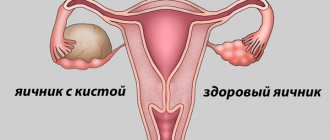This medication is available in tablet form and has the main active ingredient - dydrogesterone, which in its chemical, pharmacological properties and molecular structure resembles the natural hormone produced by the body - progesterone.
But since it is not a derivative of testosterone - a natural hormone from the male “set” - it does not have the side effects of androgenic progestogens. It does not have negative properties - androgenic, estrogenic, anabolic and thermogenic activity, does not suppress hematopoietic functions, does not reduce metabolism and does not suppress liver function.
It is prescribed for endogenous progesterone deficiency, as it has a beneficial effect on the endometrium, prevents the development of hyperplasia, and relieves excess estrogen. However, it does not affect reproductive functions and does not suppress the menstrual cycle. Does not affect conception or pregnancy.
The drug begins to act 2 hours after you receive the dose, and finally and completely goes away after three full days.
Side effects are observed quite rarely.
These include:
- hemolytic anemia;
- headache;
- minor liver dysfunction;
- weakness;
- abdominal pain;
- allergic reactions;
- pain in the mammary glands;
- breakthrough uterine bleeding.
If the latter side effect occurs, the drug should not be stopped, but rather the dose should be increased.
There is only one contraindication – individual intolerance.
Since Duphaston affects the hormonal system, it is not advisable to take it without a doctor’s prescription. Self-medication may have an adverse effect on egg maturation.
Does duphaston affect ovulation?
Schedule of changes when taking the drug
The instructions for use of the drug state that duphaston does not block ovulation and does not cause menstrual dysfunction. The main active ingredient of the drug is dydrogesterone, which has an optimal structure. It compares favorably with other drugs from the progestogen group, as it has fewer side effects.
The drug duphaston is prescribed for insufficient production of progesterone in the body. In the presence of female infertility, it is used only in the second phase of the menstrual cycle - from 14 to 25 days. The course of treatment begins after ovulation is completed. The drug does not affect the condition of the ovaries; its work does not suppress the release of the egg from the follicle. Therefore, Duphaston cannot in any way influence the presence of the ovulatory process.
The medicine normalizes the condition of the endometrium of the uterus and promotes the development of pregnancy. The drug does not affect ovarian function; it works after ovulation is completed. Duphaston promotes the attachment of a fertilized egg to the uterine mucosa. Its use significantly increases the likelihood of maintaining pregnancy.
Duphaston functions
The medicine is a regular white tablet. The key component in its composition is dydrogesterone. The principle of action of the tablets is hormonal.
Basically, the use of Duphaston falls on the second phase of the cycle. The treatment regimen itself is determined only by the doctor. The medicine is prescribed due to the diagnosis of various pathologies, including:
- insufficient or thickened endometrium;
- luteal deficiency;
- bleeding in the uterus;
- irregular periods;
- pregnancy failure or infertility.
Treatment with the appropriate drug is carried out only if the woman is of reproductive age.
Once in the body, the loss of its own progesterone begins to be replenished. The concentration of the substance becomes maximum approximately two hours after administration.
Change in basal temperature upon admission
A slight increase in BT when taking the drug is considered normal.
Basal temperature is one of the indicators by which the period of ovulation can be determined. At the moment the egg leaves the follicle, the woman’s body temperature rises slightly – by 1-1.5 degrees. Therefore, patients often monitor this indicator in order to determine the possible timing of conceiving a child.
Stopping the drug
There is no general opinion among doctors regarding drug withdrawal, but they are all similar in that only a doctor should do so.
In each case, the gynecologist individually develops a plan for discontinuing the hormonal drug under constant monitoring of the level of progesterone in the blood. It may be contained in a normal amount, and then cancellation is prescribed according to the general principle, or there may be a slight deviation from the norm, up or down. In case of such a malfunction of the endocrine system, hormonal drugs are discontinued according to special schemes developed specifically for each specific case and strictly under the supervision of a gynecologist.
The regimen may include reducing the dose by one tablet per day or by 1/2. It is possible to accurately determine the dosage by which the intake should be reduced only after determining the level of the hormone. The cancellation procedure may last several days or may take weeks.
Why and to whom is duphaston prescribed?
Indications for the use of the drug are the following conditions:
- Female infertility caused by luteal phase disorder.
- Endometriosis is a tumor disease of the reproductive system.
- A history of frequent miscarriages or the threat of losing a child.
- Dysmenorrhea – menstrual irregularities.
- Amenorrhea is a prolonged absence of menstruation.
- Abnormal uterine bleeding.
- The constant presence of premenstrual syndrome (PMS).
Duphaston can be prescribed to stimulate ovulation. With an irregular cycle, ovulation occurs on different days of the month, so it is almost impossible to monitor it. To stabilize the hormonal cycle, hormonal therapy is used, one of the components of which is progesterone. Proper treatment shifts the ovulation period and normalizes the menstrual period.
Another indication for the use of Duphaston is natural or surgically induced menopause. In patients at this stage, the production of estrogens is activated, which stimulate the growth of the endometrium of the uterus. The pronounced influence of these hormones can lead to the development of hyperplastic processes and cancerous degeneration. Therefore, in the second phase of the cycle, the patient is prescribed progesterone therapy to control endometrial activity.
Ovulation in a woman's life
Ovulation is the release of a mature egg from the dominant follicle. It first appears in a girl during puberty, and then, until menopause, it appears every month. The ovulatory period is the most favorable day for conceiving a child.
In each specific case, ovulation may occur on different days. On average, it comes on the 14-16th day of the cycle, provided that the cycle is 28 - 30 days.
There are times when a woman does not ovulate. There may be several reasons:
- Polycystic ovary syndrome;
- Diseases associated with the endocrine system;
- Taking hormonal contraceptives;
- Stress;
- Excessive physical activity;
- Early menopause;
- Inflammatory processes of the female appendages;
- Similar.
Whatever reason a woman has, she needs to get rid of it, because if there is no ovulation, there will be no child.
And it happens that there was ovulation, the child was successfully conceived, but the instability of the woman’s hormonal levels led to a spontaneous miscarriage.
All these processes are directly related to female hormones, which are responsible for the success of conception. Therefore, medicine presents many drugs that have a positive effect on such conditions.
Duphaston when planning pregnancy
To conceive a child, the fertilized egg must attach to the lining of the uterus. The endometrium must be ready for implantation. Stimulation of the growth of the inner layer of the mucosa occurs under the influence of endogenous progesterone.
If a woman does not produce natural hormones, she is prescribed replacement therapy. Duphaston after ovulation ensures the fixation and preservation of the embryo in the uterine cavity.
Does it always help?
Despite the fact that the drug has a positive effect on the body of patients who are unable to become pregnant, this does not mean that it should be used by all infertile people. There are many causes of infertility, but this medicine only helps with a lack of progesterone. The presence of its analogue in Duphaston helps eliminate this problem. In other cases, the drug does not work, which is why there are many negative reviews about its use.
Such treatment should be prescribed by a specialist after conducting the study. Unauthorized use of these pills can even worsen the situation.
On what day of the cycle should I start taking it?
Features of taking the drug depend on the disease for which it is prescribed:
- For luteal insufficiency accompanied by infertility, the drug is prescribed from 14-15 to 25 days of the menstrual cycle.
- If there is a threat of abortion, treatment with the drug is carried out for several days until the symptoms disappear completely.
- For menstrual cycle disorders and premenstrual syndrome, the medicine is used from 11 to 25 days of the cycle.
- For abnormal uterine bleeding, therapy with the drug is carried out for 6-7 days.
Note!
To correctly determine the phase of the menstrual cycle, you can use diagnostic techniques for the release of an egg from the follicle. If a woman receives a positive ovulation test, then duphaston can already be used.
What is the drug “Duphaston”
“Duphaston” is a medicine whose active ingredient is the hormone progesterone. Progesterone is produced in the body of women in certain quantities. It ensures the possibility of pregnancy and helps maintain it. With some health problems, the synthesis of progesterone in the female body may be disrupted, as a result of which reproductive function is noticeably reduced.
Progesterone drugs, which include the described drug, are prescribed in the following cases:
- if there is a threat of miscarriage
- with recurrent miscarriage
- with uterine bleeding
- for endometriosis
- for infertility
- for painful menstruation and amenorrhea
Some doctors recommend Duphaston in the absence of ovulation. It is worth noting that it should be prescribed by a doctor after receiving tests, the results of which confirm progesterone deficiency.
How to take the drug correctly?
The dosage and frequency of administration is determined by the indication for use of the medicine:
- when stimulating ovulation against the background of infertility, the dosage is 10 mg of the drug daily;
- if there is a threat of abortion, a large dose of 40 mg is initially administered, after which a maintenance dose of 10 mg is prescribed every 8 hours;
- with a large number of abortions in history, the woman is prescribed constant use of the drug 10 mg twice a day until 20 weeks;
- for menstrual irregularities and PMS, as well as for abnormal uterine bleeding, the standard dosage is used - 10 mg 2 times a day in the morning and evening.
Note!
Before starting to use the drug, you should consult your doctor. The specialist will assess the patient’s condition and select the optimal treatment regimen.
Pharmacological properties of the drug
Duphaston is a progestogen that actively works when taken orally. How does Duphaston affect the body? Due to the fact that dydrogesterone is not a derivative of testosterone, its effect on the body is not accompanied by any similar effects that are characteristic of almost all synthetic progestogens.
The active substances of the drug selectively act on the endometrium, minimizing the risk of developing hyperplasia and/or carcinogenesis, which is caused by excess estrogen.
With therapy based on this drug, the therapeutic effect is achieved without disruption of the menstrual cycle. But if the dosage is exceeded, according to Western studies, dydrogesterone can inhibit the ovulation process. We'll talk about this in more detail a little later.
Read on to learn how to take Duphaston – before or after ovulation?
Contraindications and negative reactions
Contraindications to the use of duphaston is individual intolerance to the components of the drug. When using the drug in the presence of hypersensitivity, severe adverse reactions occur. The most common side effects from using duphaston include:
- headaches, including migraine headaches;
- hives;
- skin itching;
- Quincke's edema;
- allergic rash;
- swelling in the limbs;
- increased sensitivity of the mammary glands;
- abdominal pain, weakness, malaise, jaundice.
What side effects may there be?
Rarely, Duphaston leads to the development of side effects. Women may experience the following symptoms:
- discomfort in the stomach;
- increased gas formation;
- nausea;
- weakness;
- dizziness;
- minor headaches;
- spotting between periods;
- swelling;
- paleness of the skin;
- irritability;
- drowsiness;
- decreased performance;
- delays in menstruation.
The medication can also provoke an allergic reaction. The intensity of the symptoms varies individually.
You may feel dizzy after taking it











